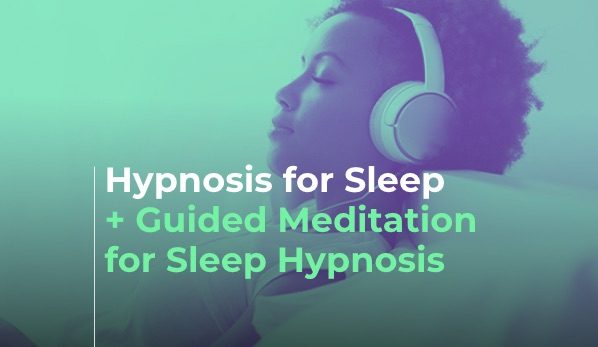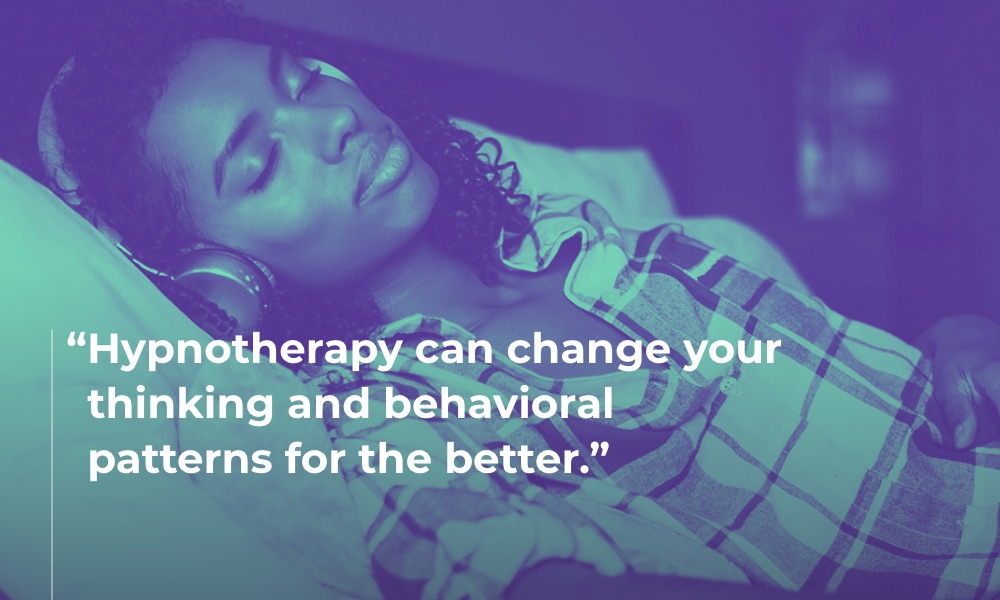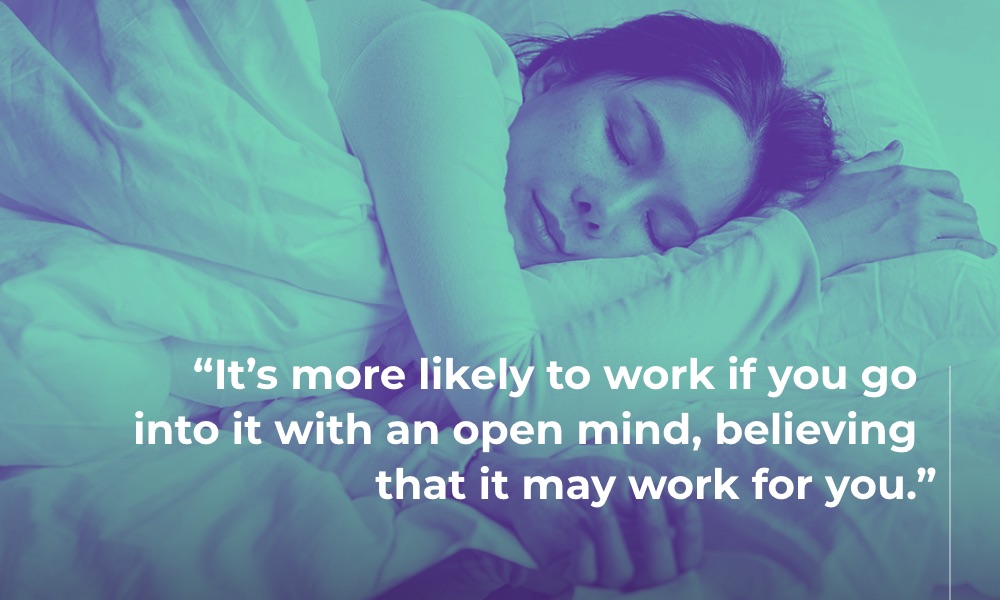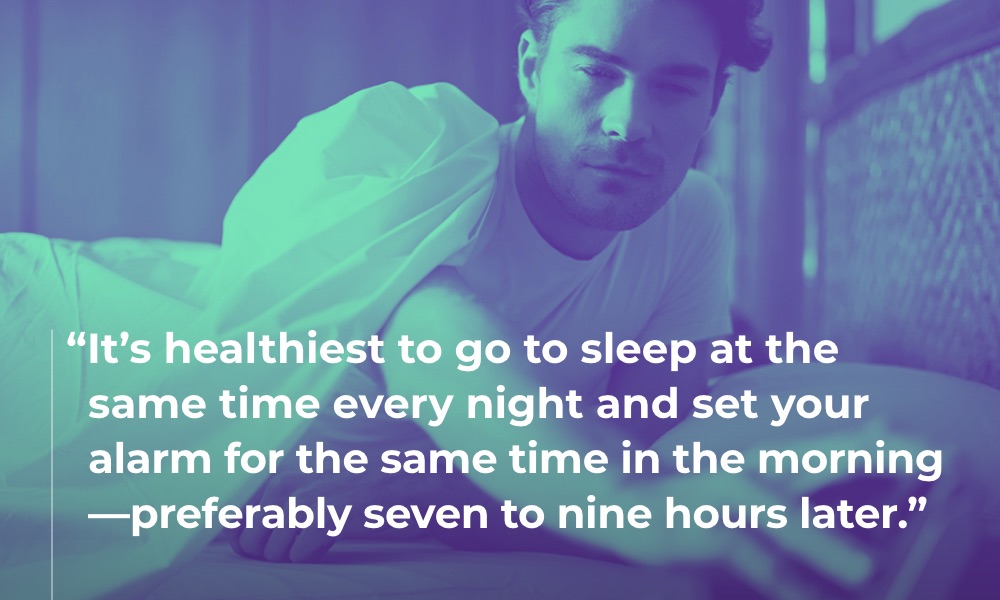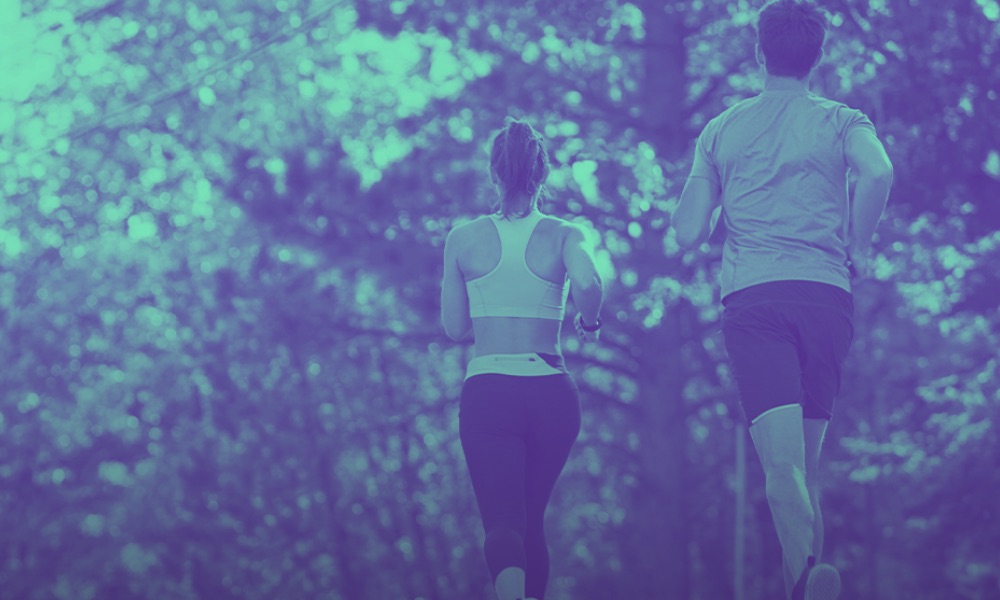There are few things more frustrating than struggling to fall asleep at night. When you don’t get enough shut-eye, it can cause undue stress and impaired performance. It can put a strain on your relationships, your physical and mental health, and it can even damage your self-esteem.
Unfortunately, far too many of us are familiar with these problems. In fact, one in three adults isn’t getting enough sleep at night.
So, what’s the solution? Prescription and over-the-counter sleep aids and other substances you may use to fall asleep, like alcohol, come with health implications that make them a poor long-term choice for most people. Fortunately, hypnosis for sleep is an excellent all-natural alternative. We’ll discuss what it is, how it works, and a few other ways to guarantee a good snooze.
What Happens When You Don’t Get Enough Sleep?
Some harmful habits (like smoking cigarettes and eating junk food) have direct consequences, but lack of sleep can seem inconsequential. However, the reality is that the health implications are grave.
Sleep issues and sleep disorders can weaken your immune system, leading to sickness and disease. A lack of restful sleep can promote weight gain and increase your risk of stroke and diabetes over time. Even occasional sleep loss can have undesirable effects, like reduced interest in your favorite exercise routine or irritability with your coworkers, family, and friends.
Alarmingly, a lack of high-quality sleep can also impact your career performance. Studies show that not getting enough shut-eye is comparable to intoxication. It reduces your daytime alertness, increasing the likelihood of making mistakes and occupational injury. You wouldn’t try to land a new client or make a big presentation while drunk, and you should treat sleep loss the same way.
Plus, science shows that lack of sleep impairs both your memory and your ability to process information—good luck trying to remember that colleague’s name!
Thankfully, hypnosis for sleep is an effective way to get a better night’s sleep. Let’s start by understanding what hypnosis is.
What is Hypnosis?
Hypnotherapy is a type of therapy that guides you toward a state of heightened focus, attention, and suggestibility. If you’ve ever tried mindfulness meditation, you may have an idea of how hypnosis feels. Most people describe it as a sense of deep relaxation and focus.
Your hypnotherapist (either in-person or through a guided hypnosis app like Primed Mind) begins by using a soothing voice to guide your body and mind into a relaxed state. After that, the hypnotherapist uses additional relaxation and visualization techniques to deepen your trance-like state and increase your acceptance of new information.
Once in a deep hypnotic trance, your therapist implements suggestions to help you reach your desired outcome. Hypnotherapy can change your thinking and behavioral patterns for the better.
The two types of hypnotherapy for sleep you might encounter are guided hypnotherapy and self-hypnosis.
Guided Hypnosis
This is the type of hypnotherapy most people are familiar with. In guided hypnotherapy, you meet with a therapist or use a hypnosis app that guides you into a hypnotic state. An app is the best option for most people because of its accessibility. You can use an app anytime and anywhere, without the help (or cost) or an in-person therapist.
Primed Mind is a guided hypnotherapy app. With it, you have access to a range of hypnosis topics, from sleep and anxiety to weight loss and mindset coaching. It uses pre-recorded audio tracks (known as audio “primers”), designed to prepare the conscious and unconscious mind to be more receptive to new suggestions. Primed Mind uses hypnotherapy techniques like suggestion and visualization to help you create positive behavioral patterns and encourage meaningful change in your life.
Self-Hypnosis
Self-hypnosis is a second popular type of hypnosis. When you’re performing self-hypnosis, you guide yourself into a hypnotic state. Once you’re in the relaxed state, you provide life-changing suggestions to your unconscious mind. Although this can be a helpful skill to have in your back pocket, it may be less effective. Therefore, it’s not recommended for those new to hypnosis.
Benefits of Hypnotism
Hypnosis is widely applicable to a range of conditions. It’s scientifically proven to be effective in treating issues like addiction, pain, and of course, sleep problems. Many people choose hypnotism as an alternative to prescription medications. Hypnotherapy can also be used in conjunction with those medications.
Hypnotherapy also works well when partnered with cognitive behavioral therapy (CBT). In fact, when using both hypnotism and CBT, many people find that they have “breakthroughs” that they weren’t able to achieve with cognitive behavioral therapy alone.
The biggest benefit of hypnosis with a hypnotherapy app is that you can do it whenever it works for you. You can use it when you need it most, without the hassle of waiting for an appointment.
2 Frequently Asked Questions About Hypnosis
If it’s your first time using hypnosis, you may have a few questions. Here are two of the most frequently asked questions we hear about hypnosis.
Are You Asleep During Hypnosis?
This depends on the goal of the hypnosis session! If you’re using hypnosis specifically to fall asleep, then yes, you will likely nod off before the session ends. But hypnosis and sleep are not the same thing. And conventional hypnotherapy doesn’t induce a sleep state. Instead, the person is in a very calm and focused state, which may appear to an outside observer as being asleep.
Does Hypnosis Work for Everyone?
Just like any other type of therapy, hypnosis works better for some people than it does for others. It’s more likely to work if you go into it with an open mind, believing that it may work for you. The only way to know if hypnosis is right for you is to try it. Hypnosis is an extremely low-risk therapy with few to no side effects and many benefits, so it’s a good idea to give it a shot.
What is Hypnosis for Sleep?
Hypnosis for sleep is a type of hypnotism designed to help you fall asleep quickly and improve your sleep quality. Guided hypnosis audios help you nod off by quieting your mind and relaxing your body.
How Hypnosis for Sleep Works
Like other types of hypnosis, hypnosis for sleep works by inducing you into a calm, trance-like state.
Then, the hypnotherapist gives hypnotic suggestions that help you fall asleep. These suggestions can be visualizations, metaphors, and recommendations for relaxation and improved sleep hygiene.
Effectiveness of Sleep Hypnosis
There’s evidence that hypnosis can positively impact your sleep in a couple of different ways. It can combat insomnia (the inability to fall or stay asleep) in both adults and children. It can also improve your deep sleep (also known as slow-wave sleep). Slow-wave sleep is critical for forming memories, brain restoration, and waking up feeling well-rested and ready to take on the day.
A Hypnosis Audio for Sleep
How to Practice Good Sleep Hygiene
Hypnosis for sleep is most effective when you’re practicing other habits that help you get good-quality sleep. You may be surprised to learn that what you do when you’re awake has a large impact on how and when you sleep.
Just like good physical health is a combination of several factors (like exercise and nutrition), so too is good sleep. These factors are called “sleep hygiene,” and it’s important to have a good sleep hygiene routine up your sleeve. Here are a few practices to include in your routine:
- Go to sleep and wake up at the same time each day. Although it can be tempting to let the television schedule dictate your sleep routine, we advise against it. It’s healthiest to go to sleep at the same time every night and set your alarm for the same time in the morning—preferably seven to nine hours later. A regular sleep schedule benefits your circadian rhythm, which is like your body’s internal clock. When you honor your circadian rhythm, you’ll notice all kinds of benefits, like a stronger immune system and more focus during the day.
- Avoid using tech devices within one hour of bedtime. Studies show that blue light (the type of light emitted from devices like your phone and tablet) can interfere with sleep. So to practice good sleep hygiene, it’s important to put these devices down (and pick up a good book instead!) at least an hour before bed. If you’re using a podcast, guided sleep meditation, or hypnosis app to help you fall asleep, simply turn off the screen or flip the device over so the light isn’t shining in your eyes.
- Keep your bedroom cool. Keeping your room cool also encourages the production of melatonin, a hormone critical to helping you sleep well.
- Limit or avoid caffeine or alcohol before bedtime. If you’re not sleeping well, it can be tempting to remedy that with caffeine throughout the day. Maybe a late-afternoon latte calls your name most workdays. And after a long day of running on little sleep, it can be tempting to wind down with a glass of wine or beer. Though caffeine and alcohol are fine in moderation, having them too close to bedtime can interfere with your sleep cycle. Try going for a quick walk to up your energy in the afternoons instead, and opt for herbal tea to settle down at night.
- Get sunlight and exercise each day. For many of us, our modern lifestyles include staying inside, staring at a computer for much of the day. Unfortunately, neither of these habits is conducive to restful sleep. Getting sunlight each day is essential for regulating the hormones that help us sleep. Similarly, regular exercise is proven to reduce the amount of time it takes to fall asleep at night.
- Establish a bedtime routine. The best way to stick to healthy habits is to make them part of a routine, so take the time to establish a bedtime routine that works for you.
Fitting Sleep Hypnosis Into Your Sleep Hygiene Routine
For the best chance at falling asleep easily, make hypnosis for sleep a part of your bedtime wellness routine. You might try making it a habit to settle into bed with a guided sleep hypnosis primer immediately after brushing your teeth. That way, you can let go of stressful thoughts and set your mind up for healing while you sleep.
Incorporating Hypnosis for Sleep with Primed Mind
When you don’t get restorative sleep, it impacts every part of your personal and professional life.
Hypnosis for sleep can be an excellent natural solution to try before resorting to sleeping pills or other methods. You don’t need to go to a hypnotherapist’s office; The Primed Mind app helps you experience the life-changing effects of hypnosis anytime, anywhere.
Primed Mind is free to download and has primers for falling asleep quickly, letting go, adapting to a new time zone, and even falling back asleep when you wake up in the middle of the night. Or, you can try our seven-day course on improving sleep quality. Check us out today, and start getting better sleep tonight!

